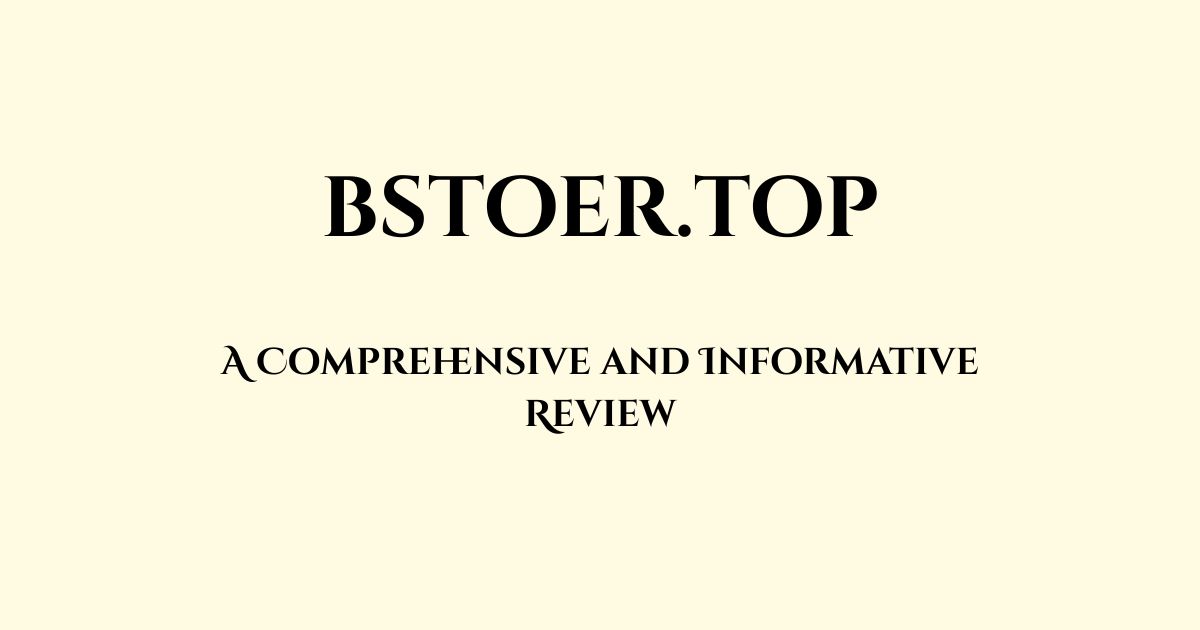In today’s digital world, the internet offers endless opportunities for learning, shopping, entertainment, and communication. However, it also harbors numerous risks—especially from obscure or suspicious websites that users may stumble upon unintentionally. One such domain that has recently drawn attention is bstoer.top. While it may appear as just another random URL, closer inspection reveals potential red flags that warrant caution.
This article provides a detailed, informative, and original analysis of bstoer.top. We’ll explore what the site is (or appears to be), how it functions, possible intentions behind its existence, associated risks, and practical steps you can take to protect yourself online. Whether you’ve encountered bstoer.top in your browser history, received a link via email, or simply heard the name and are curious, this guide will help you understand the full picture—without technical jargon or alarmist language.
By the end of this 2,500+ word article, you’ll have a clear understanding of why domains like bstoer.top should be approached with skepticism and how to navigate the web more safely.
Understanding the Domain: What Is bstoer.top?
At first glance, bstoer.top looks like a typical website address. The “.top” extension is a generic top-level domain (gTLD) introduced in 2014 as an alternative to more common endings like .com or .org. While legitimate businesses do use .top domains, they are also frequently adopted by low-quality or temporary sites due to their low registration cost and minimal verification requirements.
The name “bstoer” doesn’t correspond to any widely recognized brand, service, or public figure. A quick search reveals no official company, product, or organization by that name. This anonymity is often a hallmark of domains used for short-term campaigns—sometimes benign, but often malicious.
When attempting to visit bstoer.top, many users report one of several outcomes:
- The site fails to load entirely.
- It redirects to another, unrelated page.
- It displays pop-ups, fake alerts, or aggressive advertisements.
- It prompts the user to download software or enable notifications.
These behaviors are not signs of a trustworthy or user-focused website. Instead, they suggest that bstoer.top may be part of a broader network of domains designed to generate ad revenue, collect user data, or distribute potentially unwanted programs (PUPs).
Technical Analysis of bstoer.top
To better understand bstoer.top, we can examine its technical footprint using publicly available tools like WHOIS databases, VirusTotal, and URL scanners.
WHOIS Information
A WHOIS lookup for bstoer.top typically shows that the domain is registered through a privacy-protected service. This means the owner’s personal details—name, address, email—are hidden behind a proxy. While privacy protection is legal and sometimes used by legitimate entities for security reasons, it’s also a common tactic among bad actors who wish to remain anonymous.
Additionally, the domain’s registration date is often recent—sometimes only a few weeks or months old. Short-lived domains are frequently used in “hit-and-run” schemes: they operate just long enough to achieve a goal (e.g., spreading malware or harvesting clicks) before being abandoned and replaced with a new domain.
Security Scans and Reputation
Multiple cybersecurity platforms, including Google Safe Browsing and Norton Safe Web, have flagged bstoer.top or similar domains as potentially unsafe. Although the exact risk level may vary over time, consistent reports of redirects, intrusive ads, and suspicious scripts indicate a pattern of questionable behavior.
VirusTotal—a service that aggregates data from over 70 antivirus engines—often shows mixed but concerning results for bstoer.top. Some scanners may label it as “clean,” while others detect phishing indicators, malicious JavaScript, or connections to known adware networks.
This inconsistency doesn’t mean the site is safe. Instead, it reflects the evolving tactics of threat actors who design sites to evade detection temporarily.
Common User Experiences with bstoer.top
Real-world reports from internet users provide valuable insight into how bstoer.top operates in practice. Based on aggregated feedback from forums, tech support communities, and cybersecurity blogs, here are the most frequently reported experiences:
Unexpected Redirects
Many users say they never intentionally visited bstoer.top. Instead, they were redirected there after clicking on a seemingly harmless link—perhaps in a search result, social media post, or even a compromised ad on a legitimate website. These redirects often occur through a chain of intermediate URLs, making it difficult to trace the original source.
Fake System Alerts
Upon landing on bstoer.top, some visitors encounter alarming pop-ups that mimic operating system warnings. For example:
- “Your computer is infected with 5 viruses!”
- “Windows Security Alert: Immediate action required!”
- “Your browser is outdated—click here to update.”
These messages are designed to provoke fear and urgency, tricking users into downloading fake antivirus software or granting permissions they shouldn’t.
Notification Spam
Another common tactic involves prompting users to “Allow Notifications” from bstoer.top. If accepted, the site can send persistent desktop notifications—even when the browser is closed—advertising dubious products, adult content, or fake giveaways. Removing these notifications often requires manual intervention in browser settings.
Adware and Bundled Software
In some cases, bstoer.top appears as a consequence of adware already present on a user’s device. This adware may have been installed alongside free software (e.g., PDF converters, media players) without the user’s full awareness. Once active, it injects ads or redirects traffic to domains like bstoer.top to generate pay-per-click revenue for the operator.
Why Does bstoer.top Exist? Possible Motivations
Understanding the “why” behind a domain like bstoer.top helps contextualize its behavior. While we can’t know the exact intentions of its operators, several plausible motives emerge based on industry patterns:
1. Monetization Through Ads
The most likely reason is financial gain via online advertising. By driving traffic—whether legitimate or forced—to bstoer.top, the operator can earn money each time a user views or clicks an ad. This model, known as “click fraud” or “ad fraud,” is widespread and often automated.
2. Data Collection
Some sites harvest user data such as IP addresses, browser types, geographic locations, and browsing habits. While this data may seem innocuous, it can be sold to third parties for targeted advertising or more nefarious purposes like profiling and social engineering.
3. Malware Distribution
Although less common with domains like bstoer.top, there’s always a risk that such sites could host or link to malware. Fake software updates, pirated content, or “free” tools are classic vectors for trojans, ransomware, or spyware.
4. SEO Spam or Link Farming
In some cases, obscure domains are created to manipulate search engine rankings. By generating backlinks or hosting keyword-stuffed content, operators attempt to boost the visibility of other sites—often for black-hat SEO purposes.
Regardless of the specific motive, the end result for users is usually negative: wasted time, compromised privacy, or degraded system performance.
Risks Associated with Visiting bstoer.top
Interacting with bstoer.top—even briefly—can expose you to several risks:
Privacy Violations
The site may deploy tracking scripts, cookies, or fingerprinting techniques to monitor your activity. This information can be used to build a profile of your interests, which is then sold or exploited.
System Performance Issues
Aggressive ads and background scripts can slow down your browser or even your entire device. In extreme cases, resource-heavy pages may cause crashes or freezes.
Financial Scams
Some versions of bstoer.top promote fake tech support services, subscription traps, or counterfeit products. Users who engage may end up paying for services they never received or sharing payment details with fraudsters.
Secondary Infections
If you download anything prompted by bstoer.top—even something that looks like a “security update”—you risk installing malware. Once inside your system, this software can steal passwords, log keystrokes, or turn your device into part of a botnet.
While bstoer.top itself may not always deliver malware directly, it acts as a gateway to more dangerous content.
How to Protect Yourself from Sites Like bstoer.top
The good news is that you can significantly reduce your risk with a few proactive measures:
Use Reputable Security Software
Install and regularly update antivirus and anti-malware programs from trusted vendors (e.g., Bitdefender, Malwarebytes, Windows Defender). These tools can block access to known malicious domains and scan downloads in real time.
Keep Your Browser and OS Updated
Software updates often include security patches that close vulnerabilities exploited by malicious sites. Enable automatic updates whenever possible.
Be Cautious with Links and Downloads
Avoid clicking on suspicious links, especially in emails, social media messages, or pop-up ads. Hover over links to preview the destination URL before clicking.
Manage Browser Notifications
If a site asks to send notifications, decline unless you’re certain it’s trustworthy. You can review and remove existing permissions in your browser settings (e.g., Chrome: Settings > Privacy and Security > Site Settings > Notifications).
Use an Ad Blocker
Ad blockers like uBlock Origin not only improve browsing speed but also prevent many malicious ads and redirects from loading.
Clear Your Cache and Cookies Regularly
This reduces tracking and can stop persistent redirects caused by stored site data.
If you suspect your device has been compromised after visiting bstoer.top, run a full system scan and consider resetting your browser settings to default.
What to Do If You’ve Already Visited bstoer.top
Don’t panic—but do take action. Here’s a step-by-step response plan:
- Close the tab immediately. Avoid interacting with any buttons or prompts.
- Check for unusual behavior. Is your browser slower than usual? Are you seeing unexpected ads?
- Review notification permissions. Remove bstoer.top from your allowed sites list.
- Scan your system. Use your antivirus software to perform a deep scan.
- Change passwords if you entered any credentials on the site (though you shouldn’t have!).
- Monitor accounts for suspicious activity, especially if you suspect data theft.
In most cases, simply closing the page and running a scan is sufficient. The real danger comes from engaging with the site’s prompts.
The Bigger Picture: The Rise of Disposable Domains
bstoer.top is not an isolated case. It’s part of a growing trend of disposable or “throwaway” domains used in cybercrime. Cybercriminals register hundreds or thousands of such domains, use them briefly, and discard them once they’re blacklisted. This cat-and-mouse game makes detection and prevention challenging.
Registries like .top, .xyz, and .online are particularly popular for these schemes due to low costs and lax oversight. While ICANN (the organization overseeing domain names) has taken steps to improve accountability, the problem persists.
As a user, your best defense is awareness and skepticism. If a website looks unfamiliar, offers something too good to be true, or behaves aggressively, trust your instincts and leave.
Conclusion: Stay Informed and Stay Safe
In summary, bstoer.top is a suspicious domain with no clear legitimate purpose. Evidence suggests it’s used for ad monetization, user tracking, and possibly malware distribution. While visiting it once may not cause immediate harm, repeated exposure or interaction increases your risk significantly.
Throughout this article, we’ve examined the technical characteristics of bstoer.top, common user experiences, potential motivations behind its existence, associated risks, and practical protection strategies. Remember: the internet is a powerful tool, but it requires vigilance.
If you encounter bstoer.top again, avoid engaging with it. Use the safety measures outlined above, and encourage others to do the same. Reporting suspicious sites to your browser provider or cybersecurity organizations can also help protect the wider community.
Ultimately, domains like bstoer.top serve as reminders that not everything online is as it seems. By staying informed and adopting safe browsing habits, you can enjoy the benefits of the digital world while minimizing its dangers. Whether you’re a casual user or a tech professional, understanding threats like bstoer.top is an essential part of modern digital literacy.
Stay safe, stay skeptical, and remember: when in doubt, close the tab and walk away. Your online security is worth it.












